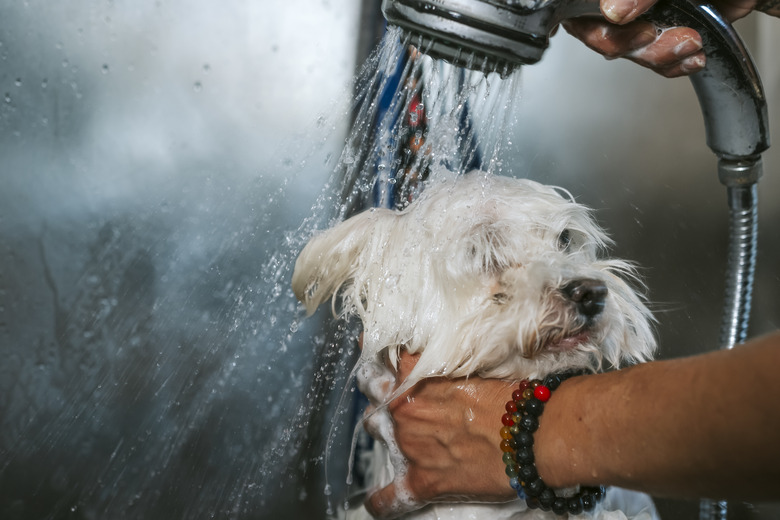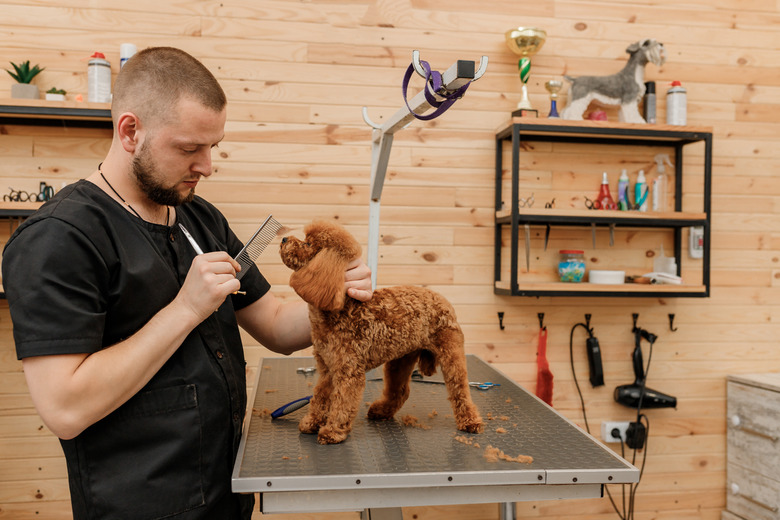Why A Dog Loses Hair & Smells Bad
If your dog is losing hair and smells bad, the cause could due to a bacterial or fungal skin infection, allergies, parasites like fleas or mites, or an underlying endocrine disease. Take your dog to the veterinarian for an accurate diagnosis and treatment. She will likely take skin samples or perform a biopsy to get to the bottom of your dog's hair loss — or alopecia — and foul odor.
Canine pyoderma infection
Canine pyoderma infection
Pyoderma refers to pus in the dog's skin, occurring because of a bacterial infection. While pus-filled lesions are always present in pyoderma, the dog may or may not lose hair. The infection causes the skin to smell quite rank. You may notice that your dog's neck smells, for example. Any breed of dog can develop pyoderma. Additional symptoms include:
- itching
- crustiness
- or scaliness
Topical and systemic antibiotics are used to treat the condition, but pyoderma usually has an underlying cause like allergies, and will most likely recur if the underlying condition is not properly diagnosed and treated.
Seborrhea in dogs
Seborrhea in dogs
Are you concerned about why your dog smells bad and is losing hair? Dogs with seborrhea develop greasy coats and skin, and that oiliness often smells quite bad. Hair loss occurs because the dog scratches at the areas with the oily build-up. Some breeds are genetically predisposed to seborrhea. These include:
- cocker and springer spaniels
- dachshunds
- Labrador and golden retrievers
- basset hounds
- Doberman pinschers
- German shepherds
- Shar-Peis
- and West Highland white terriers.
Non-hereditary seborrhea results from allergies, parasite infestation and endocrine and other disorders. For the inherited form of seborrhea, there is no real for the condition, but your veterinarian can prescribe medications and recommend supplements safe for dogs to control the greasiness. Sulfur shampoos designed for canines can stem the oil and smell, as can cleansers containing acne control products such as benzoyl peroxide or salicylic acid that are formulated for use in dogs.
Any secondary infections due to seborrhea require antibiotic or antifungal topical or systemic therapy, according to the results of skin testing. Feeding your pet a high-quality dog food and giving him omega-3 fatty acid supplements can improve skin and coat quality. Discuss these options with your veterinarian before administering to your dog.
Canine yeast infections
Canine yeast infections
Skin with a strong stench may indicate a yeast infection, usually caused by a fungus called Malassezia pachydermatis, which is a common cause for skin disease in dogs due to a yeast overgrowth. Some people find that their dog smells like burnt hair.
If a yeast infection is present, your dog doesn't just lose hair — his skin may become thickened and develop wrinkles and folds. He itches constantly, and the infection can spread all over his body. Certain breeds are also predisposed to yeast infections, and these include:
- West Highland white terrier
- basset hound
- American cocker spaniel
- Shih tzu
- poodle
- boxer
- Cavalier King Charles spaniel
- German shepherd dog
- dachshund
An allergy can create an environment on the skin where yeast can grow out of control and lead to infection, as can seborrhea — a double whammy for a dog already affected with an oily, smelly skin condition. Treatment consists of shampooing at least twice weekly with anti-yeast and degreasing cleansers, along with oral antifungal drugs such as ketoconazole or fluconazole. The underlying cause requires diagnosis and treatment, or the yeast infection will never be completely eradicated.
Treating your dog's allergies may require immunotherapy shots, food trials, medications to control itching, treatment of infections and regular monthly flea preventatives. Many allergic dogs have multiple allergies and generally require lifelong management to keep them comfortable and symptom free. Depending on your dog's age and history of symptoms, your veterinarian may want to perform tests to rule out endocrine diseases like hypothyroidism and Cushing's disease, which can also cause hair loss.

